#problem of paradoxical proportions
Explore tagged Tumblr posts
Note
Hey I know it’s a fic you wrote a while back, but I was rereading APOPP and I noticed that a bunch of the images seem to be broken and aren’t showing up
Yeah we’ve been notified. We’ll get to work on them ASAP!
21 notes
·
View notes
Text
PAC: How to overcome your fears regarding relationships?
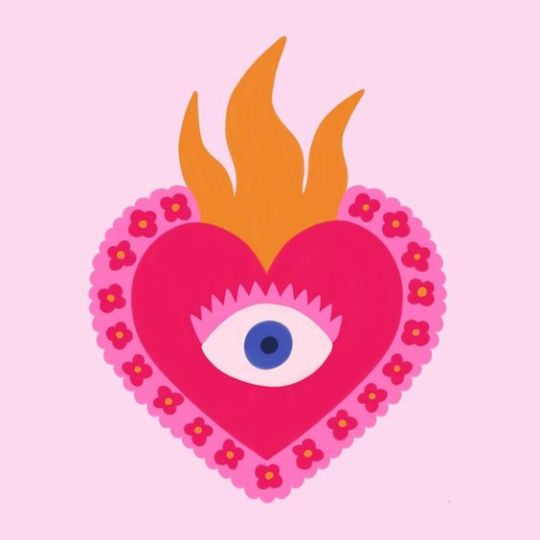


Hey :p
Here is a new love pick a card about a topic I've personally been struggling with recently, so I really wanted to dive into it.
The goal of today's reading is to look at what fears you're dealing with in matters of relationships; fears that might manifest as blockages or obstacles in your love life; and how to overcome them.
As always, this reading is meant for multiple people and there are only three piles, so take what resonates and leave out the rest. It can help focusing on your issue or a specific relationship while selecting the pile.
I offer paid readings as well, don't hesitate to reach out to me in DMs.
Ko-fi ★ book a reading ★ pinned post ★ instagram
PILE 1
Cards: 3 of Swords, 9 of Pentacles, King of Wands, Queen of Wands, Slow Down, King of Pentacles, Manic, Queen of Swords, King of Cups, Queen of Cups, 2 of Pentacles, 5 of Pentacles, the World, 7 of Wands, the Magician, the Emperor
Your fears surrounding relationship have to do with heartbreak and loss. It seems you've had your heart wounded deeply in the past. The pain was intense and it took you so long to sooth it, and you had to use all your resources to revive yourself from this state. You had to learn to be independent and flourish for your own sake, to tend to your own inner garden and make a life beautiful and enjoyable for yourself. So you not only are scared to get your heart broken again, but also to lose your individuality and the peace you built for yourself. I think you are attracted to people like you, strong individuals with ambition and passion, but you're scared it's going to get in the way of your own path and vision and lead you apart, breaking your heart once more. I believe you overthink quite a lot and expect things to go wrong before they even do.
These fears are rooted in your relentless mind, forever going full speed from one extreme to the other, in a frenetic quest for meaning and movement. It seems you have trouble feeling satisfied by anything for long because you're always looking at the next adventure, the next prize, the next achievement. It's not that you're ungrateful or anything, but rather, that you are scared you're going to be left with nothing if you stop trying to fix what's wrong in your life. You keep looking for problem to solve, perhaps due to your triggered survival instinct, and it's hard for you to stop and appreciate what you have. So the root of your fears is in your own mind, in the pathways you built years after years and that you solidified. It seems you have a hard time finding your balance, go with the flow and stay in the appreciation of the present.
These fears manifest in relationships by a hard grip on your feelings by your mind. See, your feelings are strong and run deep, and they can get overwhelming very easily. As a result, you react by dissecting them like some freaky science experiment and try to break everything down to understand them, but also to keep them under the control of your logic. It's kind of a toxic pattern, an abusive move from yourself towards yourself. Your words can be harsh and hot tempered because you feel hurt easily and can blow things out of proportions fast. You're so scared of losing your agency and getting hurt that it makes you hyper aware of every little blow at your heart and you go to war a bit too easily. I'd also say that paradoxically, you have a hard time being honest about your feelings and communicating them in a gentle and open way. You may even wait till things become unbearably painful before saying anything, instead of acting earlier when the need arose the first time. You struggle with the idea of vulnerability a lot and perhaps your way around that is to wait till it feels like it's the other person's fault for hurting you instead of your own inability to express yourself authentically.
For what external influences play a part here, I'd say first that you have a strong personal sense of what you need from life and relationships, but that you doubt yourself a lot. You keep comparing yourself to what others have, or what society expects and this is making you feel depleted and resource-less. It's like, people say one thing, and you know it's wrong, but for some reason you keep entertaining the idea even though you know it's rotten and useless for you. In addition, you also feel pressed by time, as if you felt you were following some type of transcending schedule you had to abide by, and if you are late or out of sync, then that means you are failing and it's causing your fears to intensify. This is making your fears worse because these expectations weight on your mind and make you feel broken and worsen you destructive patterns.
For how to overcome your fears, your first need to let go of the struggle mindset. No, life is not out there to get you and you aren't going to lose everything if you dare opening up to love. You are too defensive of your heart and too combative in your approach. You need to replace that mindset by bringing all elements of yourself in harmony. Your mind shouldn't fight your emotions, your passion shouldn't clash with the respect of your boundaries. What I'm trying to say is to take a look at what you're over-doing and what you're neglecting, and bring some balance within yourself. You must also bring clarity in your mind about what it is you want and hold the vision, knowing that you will find what you need when the right opportunity arises. Also, don't hesitate to advocate your your needs and wants. Not like a tyrant, but like someone who knows themselves and know what's best for them, and go after whom they desire without fear. Yes, the battles of the heart are scary and it can be hard to go for what you want due to the fear of loss and pain, but you need to make a conscious decision to not only open up, but also let the other person know where you stand. Trust in your magic, your skills and power, you have everything that you need to succeed.

PILE 2
Cards: 4 of Swords, the Magician, the Star, Inner Awareness, Let Go rx, Queen of Pentacles, the Fool, 5 of Swords, 10 of Cups, Jealousy rx, Optimism, Queen of Cups, Page of Wands, 3 of Pentacles, Death
Your fears regarding relationship come up as fearing your hopes and dreams won't manifest. You are a romantic, a dreamer who has a beautiful and idealistic idea of what love can and should be, but you're struggling to find it. You may currently be in a state of isolation and afraid of it will never end, and that you'll be missing out on the joys of love. You are highly in tune with your higher desires, have a strong faith in the vision you have for the relationship you dream of, however, you're also highly scared that this will not become a reality, because you worry you do not have what it takes to reach your dream. I'd also say you're painfully aware of you own flaws and issues, and you worry you won't be accepted as you are.
The root cause of these fears shows up as a struggle to let go of your need to control and predict when the situation would require to simply take a step forward and embark on an adventure without worrying about the future. You may have been neglecting your love life for a while before this moment, not leaving enough space for relationships to bloom, because you perceived it as a treat for your well being at the time, which might simply mean that you hadn't met the right person or at the right time, and I think it shows up here because these disappointments made you very wary and careful about love and it's holding you back presently.
These fears manifest in your relationships by placing too high of an expectation from the get go on them. This gap between reality and dream is putting pressure on the relationship and on yourself. You may see the relationship as failing and struggling to communicate because you feel so vindicated. You might know that your approach is not working, but failing to understand why, and thinking things were not meant to be as a result, circling back on this idea of fated and perfect love. You may also compare the relationship to the ideal in your mind excessively, which is creating even more tension, anger and frustration, because it doesn't match your ideal.
For the external influences, it seems your current mindset was shaped by an environment that didn't encourage honest and authentic communication of your emotions, needs and desires. Paradoxically, you were told to always remain optimistic and hopeful, that things would always work out without effort, but without giving you the keys to how to work towards that in reality. It's as if it fed into your dreamy nature without allowing you to understand how to build the bridge between dream and reality. You didn't learn the power of your actions and how to take accountability for them, which is again feeding this imbalance between your inner world and the reality of a lived relationship. Also, circling back on the fear of not being accepted I highlighted in the first paragraph, this is also linked to your lack of skills in communication, because you expect people to understand you without having to express yourself, which is unfair to them.
For how to overcome these fears, the cards point at a few things. First, we're being led back to this idea of embarking on an adventure, with passion and confidence, and stepping out of your comfort zone. You must learn that the way you are approaching things is not working and need a deep transformation. You must learn from the mistakes of your past and start anew. Look at the future with hope but take actions toward what you desire. Also, keep in mind this idea that building a relationship requires team work and constant effort, and that things will not always be perfect and dreamy. Some days will be hard, but it doesn't mean they will never be sweet. Be open minded and enthusiastic and learn not to draw hasty conclusions on the relationship or on your person.

PILE 3
Cards: 3 of Pentacles, Page of Pentacles, 10 of Wands, Joy rx, 10 of Pentacles, 10 of Swords, 7 of Pentacles, King of Wands rx, King of Pentacles, Ace of Pentacles, 2 of Cups, 8 of Wands, Forgive rx, Intuition rx, 4 of Pentacles, the Hermit, Knight of Cups
Okay so heads up, this file feels a bit like the results of your own doing.
Your fears regarding relationships have to do with the idea of being burdened with responsibilities and losing access to the usual ways you find joy in life. I'm getting strong fear of commitment. That a committed relationship could get in the way of your present social life, friends and party habits. I see you quite mesmerized by what looks like glitter, as in, what seems attractive and exciting in the moment, which makes you ignore everything else that is around it because you're so fixated on what's in front of you. Basically, it seems like a lot of work and sacrifices for a reward that seems unsure and unsatisfying, and you fear that.
This is all rooted in what seems to be a fear of endings, as in, you fear closing a chapter of your life, both because of the pain of closing such chapter will cause (grief for a time of your life that is gone), as well as for the loss of the pleasures that come with it. You also fear things slowing down and being out of your hands, that your happiness won't depend from your own will only anymore and that you would have to work for it with someone. However, you of course don't see that behind every ending is a new beginning, and that things might not be as clear cut and as desperate and you imagine them to be. It's a bit over dramatic I feel.
This manifest in relationship by a bit of a toxicity if I'm completely honest. The cards point at rigidity and stubbornness as well as pent up anger and passive aggressiveness towards your partner. You might get fed up of them easily, because you feel restricted in your freedom. There is an inability to look past your own trauma and you're pushing its patterns onto your partner instead of addressing them directly. You end up hurting the both of you on the process.
For the external influences, I feel like there may be a connection that is triggering all these wounds for you here. Perhaps someone you were not expecting, someone who wish to come into union with you, to communicate freely and to make you a solid romantic offer. You sense that and it's making you spiral. This connection is putting pressure on you by asking you to make amends with the way you act and to own up to your bullshit (sorry). It may also trigger your intuition that is trying to tell you something, which you are refusing to listen to.
How to overcome these challenges then? The cards point at a need for a deep, thoughtful introspective journey, which will lead you to let go of your resistance to change. You're currently holding everything in, and I'm getting the image of a dam that is about to break down, little cracks growing and growing, and you're trying to cover them with your hands, but it's a losing battle. You need to learn to come forward, be vulnerable and authentic with your feelings and move towards what calls your heart without negating your deeper feelings and intuition. Make amends to you heart and pay attention to its whispers.
#pick a card#pick a pile#tarot reading#love tarot reading#love reading#divination#tarot#tarotblr#tarot community#soaringwide#soaringwide tarot reading
272 notes
·
View notes
Text
A year in illustration (2024), Part four
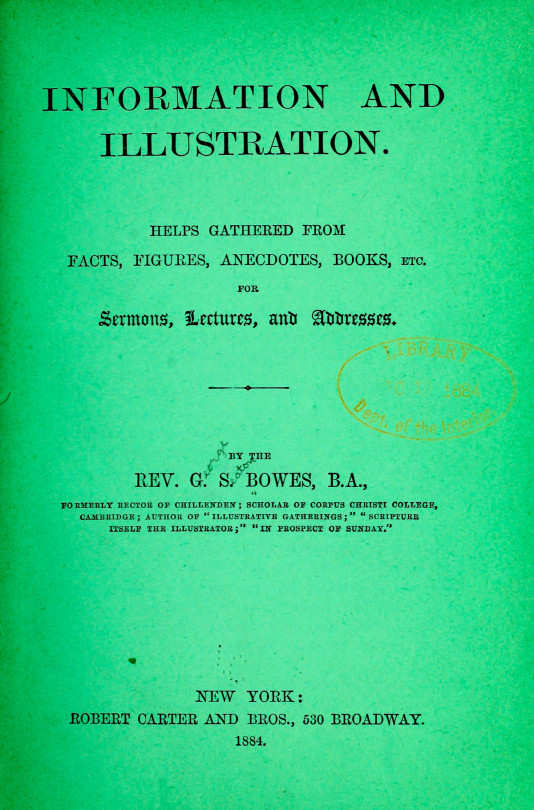

If you'd like an essay-formatted version of this post to read or share, here's a link to it on pluralistic.net, my surveillance-free, ad-free, tracker-free blog:
https://pluralistic.net/2024/12/07/great-kepplers-ghost/art-adjacent

Part one
Part two
Part three

The US Copyright Office frees the McFlurry
Figuring out how to illustrate the problems of DRM in McFlurry machines took some doing, but I'm super happy with how the HAL 9000-eyed poop emoji inside a spattered McFlurry cup (fair use of a McDonald's promo image) worked out.
https://pluralistic.net/2024/10/28/mcbroken/#my-milkshake-brings-all-the-lawyers-to-the-yard
(Image: Cryteria, CC BY 3.0, modified)

Keeping a suspense file gives you superpowers
Another Keppler classic: originally, this was FDR being offered a helping hand to cut through his paperwork. I added in one of the elephant heads I'd cropped out for election illustrations, and used it to represent "not forgetting."
https://pluralistic.net/2024/10/26/one-weird-trick/#todo

The housing crisis considered as an income crisis
The underlying image is another Keppler, showing death flamboyantly dicing with a millionaire. I added in an official (hence public domain) Reagan portrait, some monopoly houses, and a vintage aerial photo of Levittown, halftoned to disguise scaling artifacts.
https://pluralistic.net/2024/10/24/i-dream-of-gini/#mean-ole-mr-median
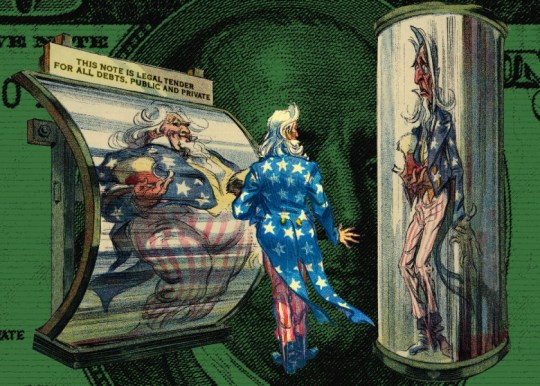
Retiring the US debt would retire the US dollar
More of Keppler's outstanding Uncle Sams! Add in a super-rezzed-up US $100 (all that intanglio looks great at high mag) and you've got an instantly arresting image.
https://pluralistic.net/2024/10/21/we-can-have-nice-things/#public-funds-not-taxpayer-dollars
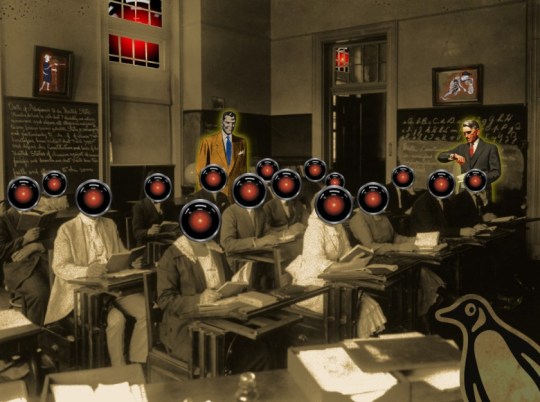
Penguin Random House, AI, and writers' rights
The impatient guy makes another appearance in this WPA image of an adult literacy class; he's joined by another "business man" type, this one from a midcentury ad for a multi-level marketing scheme selling…business suits! The pupils' heads are all HAL 9000 eyes, natch, but don't miss all the little Easter Eggs, like the reeve and peasants in the frames on the walls.
https://pluralistic.net/2024/10/19/gander-sauce/#just-because-youre-on-their-side-it-doesnt-mean-theyre-on-your-side
(Image: Cryteria, CC BY 3.0, modified)
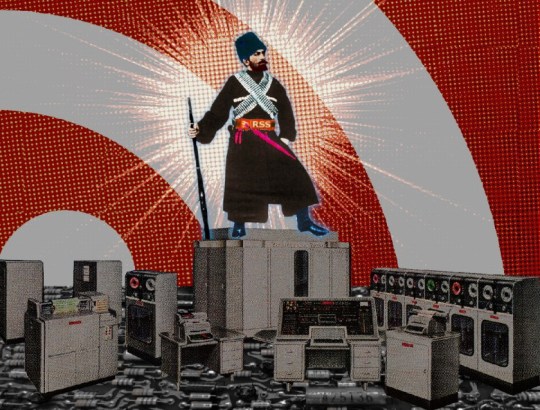
You should be using an RSS reader
The guerrilla fighter is back, this time standing atop some mainframe equipment ganked from a Univac ad. The halftoned RSS logo in the background really works, especially with a partially blended GIMP "supernova" effect behind the rebel.
https://pluralistic.net/2024/10/16/keep-it-really-simple-stupid/#read-receipts-are-you-kidding-me-seriously-fuck-that-noise
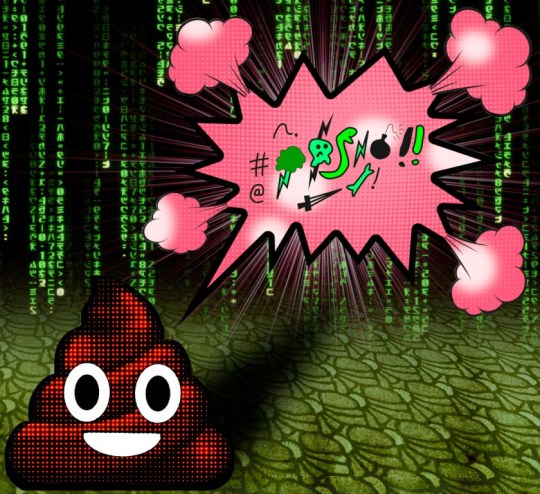
Dirty words are politically potent
I spent a bunch of time experimenting with different ways of making emphatic speech bubbles and it paid off here; that poop emoji's gawlix is in a good home. Halftoning the foreground element (the poop) works surprising well here. I should do more of that.
https://pluralistic.net/2024/10/14/pearl-clutching/#this-toilet-has-no-central-nervous-system
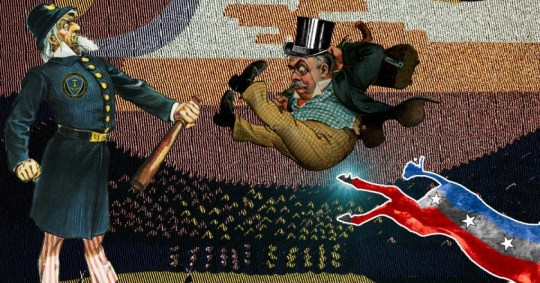
Lina Khan's future is the future of the Democratic Party – and America
Keppler's Uncle Sam Cop is back, along with another Keppler – a carpetbagger flying through the air after getting a kick in the pants. I got good use out of one of my Democratic Party donkeys here. The background is a half-tones WPA travel poster for Montana.
https://pluralistic.net/2024/10/11/democracys-antitrust-paradox/#there-will-be-an-out-and-out-brawl

Cars bricked by bankrupt EV company will stay bricked
I actually made this brick by hand: first I rescaled a box image until it had the right proportions, then I found a public domain texture that was the right kind of brick and used the perspective tool to put it over each face of the box. I told you public domain bricks are hard to find.
It was very satisfying overlaying all the elements of the Fisker car I cropped out onto the brick.
https://pluralistic.net/2024/10/10/software-based-car/#based
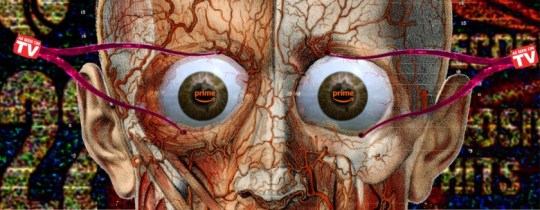
Prime's enshittified advertising
Nothing exceeds like excess! The flayed face with eyeballs comes from a 19th century book of French anatomical drawings. The calipers' handles just didn't look right (I referred to stills from Clockwork Orange to try and get 'em to work), but then I hit on the idea of using the "As Seen on TV" logo, which worked perfectly. The halftoned K-Tel ad-card background doesn't quite work, I think.
https://pluralistic.net/2024/10/03/mother-may-i/#minmax
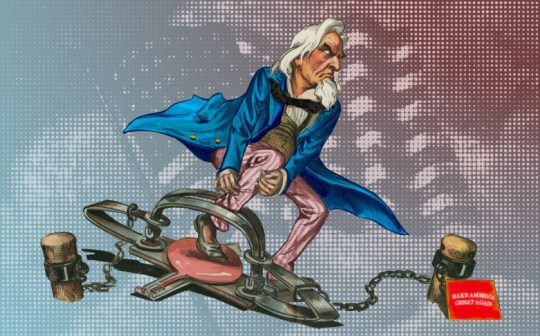
"That Makes Me Smart"
This is actually two Kepplers; the original guy in the leg-hold trap is some lost-to-history politician embroiled in a lost-to-history scandal. But once I added (yet another!) of Keppler's Uncle Sam heads to his body (recoloring his coat and converting his trousers to red stripes), it became a perfect visual representation of America, trapped. The halftoned US flag is my favorite background yet.
https://pluralistic.net/2024/12/04/its-not-a-lie/#its-a-premature-truth
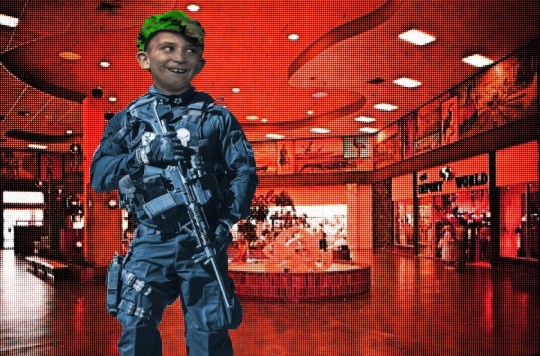
The far right grows through "disaster fantasies"
When it came to finding heavily armored and armed weirdos, I was spoilt for choice; same goes for grainy photos of vintage malls that look good after halftoning. Add in the goofy, grinning newsie's head and overlay his hat in camou, and it's perfect.
https://pluralistic.net/2024/11/24/mall-ninja-prophecy/#mano-a-mano

Boss politics antitrust
Finally, I got a chance to use Keppler's "Capital Controls the Senate!" I agonized over which corporate logos to use. Boss Tweed is back, with a Trump wig and MAGA hat.
https://pluralistic.net/2024/11/12/the-enemy-of-your-enemy/#is-your-enemy
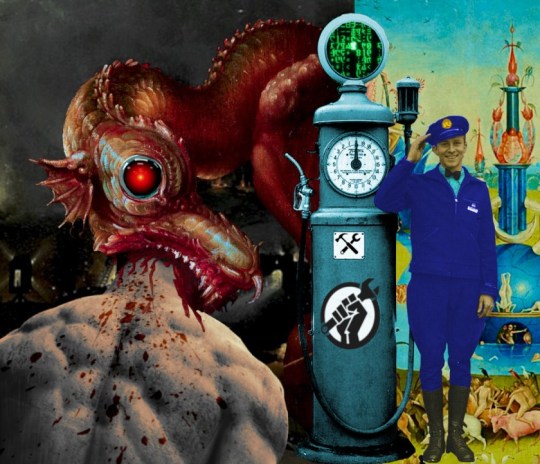
Antiusurpation and the road to disenshittification
A diptych! Both sides' backgrounds come from Bosch's "Garden of Earthly Delights" – hell on the left, heaven on the right. The happy gas-jockey's old-fashioned ethyl pump divides the scene. The head-devouring dragon (with HAL 9000's eye) is a delightfully gory detail from Goltzius's 1183 painting of a couple guys having a hard time indeed.
https://pluralistic.net/2024/11/07/usurpers-helpmeets/#disreintermediation
(Image: Cryteria, CC BY 3.0, modified)

Bluesky and enshittification
I know, canonically the sirens who tempted Ulysses were merfolk, not half-woman/half-birds, but all the merwoman versions have a ton of naked breasts in them, and frankly, Waterhouses's 1891 "Ulysses and the Sirens" just rips. It took a lot of fiddling with the perspective tool and the clone brush to swap their bodies for the Bluesky butterfly wings, but it still looked weird until I mapped in a kind of scaly, butterfly wing texture.
https://pluralistic.net/2024/11/02/ulysses-pact/#tie-yourself-to-a-federated-mast

Shifting $677m from the banks to the people, every year, forever
I replaced Moses parting the Red Sea with Keppler's Uncle Sam Cop, but something still wasn't right. Then I figured out how to turn the Red Sea into a giant, aquatic US $100 bill (loooove that intaglio!) and it was awesome.
https://pluralistic.net/2024/11/01/bankshot/#personal-financial-data-rights
#art#collages#public domain#creative commons#cc#fair use#copyfight#visual communications#illustration#pluralistic illustratons 2024
31 notes
·
View notes
Text
New interview with Simon Stephens and Andrew Scott on their upcoming play Vanya, from The Financial Times

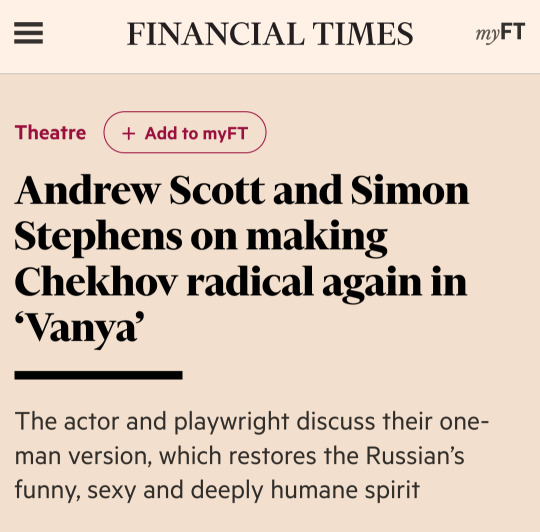
“We must declare point-blank that nobody can make head or tail of anything in this world,” wrote Anton Chekhov in a letter in 1888. Rarely is that better expressed than in Uncle Vanya, his humane masterpiece, published 10 years later, a play about a bunch of disconsolate souls rattling around a Russian country estate. Forced to stop their daily routine by the arrival of a demanding guest, they drift, doze, drink, take a look at their lives and are dismayed by what they see.
Many of them feel sorry for themselves, particularly Vanya, who at 47 is undergoing a midlife crisis of epic proportions. Yet as actor Andrew Scott observes, in the hands of Chekhov, they become not only painfully recognisable and funny, but quite heartbreaking.
“It’s funny because life is funny and there’s no tragedy if there’s no comedy,” says Scott, who is known to many for his “hot priest” in Phoebe Waller-Bridge’s Fleabag, and for superb stage performances as Hamlet and as Garry Essendine in Present Laughter. “Chekhov has such enormous compassion for people. He was a doctor and he saw how people were. I think that’s why it’s so moving.”
Scott should know. He’s about to play every one of the characters in Vanya, a striking new version by Simon Stephens. Here, the actor will play not only the protagonist but also his gentle niece Sonya, weary doctor Astrov, the pompous visiting academic and everybody else rambling about the estate in the sweltering late-summer heat.
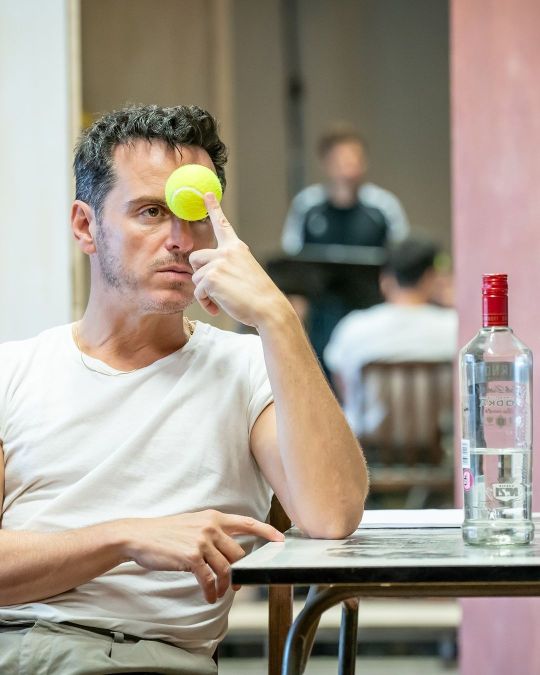
Andrew Scott in rehearsals for ‘Vanya’, in which he plays all the roles © Marc Brenner
So, I ask the writer and actor when we meet one morning before rehearsals, why is this? Could they not afford an ensemble? “I have a very bad reputation . . . ” jokes Scott, deadpan — to Stephens’ delight — before the two explain that the idea is to honour the radical impulse of Chekhov’s drama.
“I think one of the great ironies is that sometimes when you say ‘Chekhov’, people say, ‘Oh my God, is it very serious?’” says Scott. “But it’s the opposite: it’s completely human and wonderful and light as the air. And radical. He broke the form. Characters talk to the audience; they forget what they’re saying. So how do you catch that radical spirit?”
To which Stephens adds: “If you look at photographs of Chekhov, he’s funny, he’s sexy, he’s got a little twinkle in his eye. He’s not a figure from a museum.”
Chekhov chafed against the melodramatic theatrical norms of his day. “In life, people do not shoot themselves or hang themselves or fall in love, or deliver themselves of clever sayings every minute,” the playwright complained. “They spend most of their time eating, drinking, running after women or men, talking nonsense.” In his plays, one character’s heart might be breaking as everyone else witters on about the weather.
This new version heightens that poignant paradox, says Scott: it responds to Chekhov’s formal innovation by highlighting the fact that the characters, all caught up in their own problems, are far more similar than they realise.
“Usually, in the rehearsal process, you’re in charge of one character and you defend them,” he says. “This is like looking after all these people and not judging them. I have to invest in them all . . . And so much of what they are talking about — they have exactly the same wants and needs.
You play the lightness because the darkness will play itself’
“When it’s just one person [playing all the parts], you think, ‘Come on, what are you doing? This is pointless.’ And at the end, what does it matter? What are these tiny little things that we obsess about? So it squeezes out the absurdity of our preoccupations as human beings. It highlights and distils the comedy of it.”
Many recent Chekhov productions have shrugged off period detail to draw out the plays’ topicalities. But for Stephens, the genius of Chekhov’s work was that by showing humdrum life on stage, he touched on something more fundamental.
“You could say that Vanya is a great play about the cost-of-living crisis or the environment,” says Stephens. “You hear Astrov talking about the inability of humans to rise to the challenges of living in an eroding world and it feels as though it’s written this week. But for me, what’s compelling are the deeper truths about how you fall in love, how you live when you know you’re dying, how you make sense of the life that’s not been what you hoped it would be. I think there’s a timelessness to that interrogation.”
Scott and Stephens have worked together several times, and there’s a clear sympathy and ease between them. Stephens, flung over a chair, rangy and ebullient; Scott coiled up on his seat, quietly mischievous. Stephens wrote the 2008 monologue Sea Wall for Scott, an intensely moving portrayal of grief. Key to its success was their mutual ability to combine emotional honesty with lightness of touch. As Scott puts it: “You play the lightness because the darkness will play itself.”
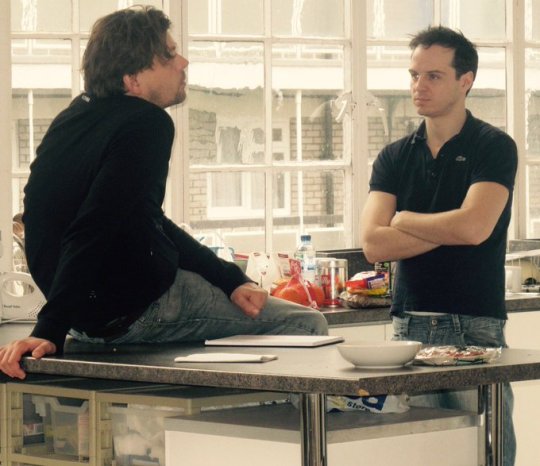
But they also share — together with Sam Yates, director of Vanya — an instinct to experiment with form. “Theatre is the lie that tells the truth,” says Scott. “Everybody sits there, knowing that those people [on stage] are pretending to be someone else. So why not acknowledge that in some way?”
In Sea Wall, Scott wandered the stage as the audience came in, then slipped into conversation with them, making the shift from actor to character hard to pinpoint. It was an approach that invited the audience to work with him in imagining the characters of the story.
Vanya builds on that. Walking through the rehearsal room, I notice props scattered about — a bunch of roses, a bottle of vodka, a kettle. The piece will be theatrical, Scott says — “You want to be able to create the world” — and Stephens’ version, though distilled, retains the dialogue. But again, the audience will play a key role in imagining the characters.
“You need them,” says Scott. “They’re your collaborators. If the audience are alert to something, their perspective on you changes. So it’s genuinely honouring the audience’s intelligence.”
He recalls experiencing this alchemy in action while playing twin brothers in Christopher Shinn’s Dying City in 2006. At one point he had to transform from one brother to the other on stage. “I remember during previews I was trying all sorts of different things. Then I thought, ‘I’m not going to do anything, at all. I’m just going to sit there.’ And people said to me, ‘I saw you change from one person to another.’ But it was absolutely an illusion.”
Stephens hopes this approach will build on the drama’s empathy, encouraging audiences to find common ground with all the characters — and with one another. In Chekhov’s final version of the play, Vanya and Sonya return to their labours in a climactic scene that contains both solace and aching sadness. His characters may despair, but they keep on keeping on. For Stephens, there’s great beauty and humanity in that honesty.
“I think it’s a profoundly optimistic play,” he says. “For me, making this with Andrew, having watched Hamlet, I think this is Chekhov’s answer to the question ‘to be, or not to be?’ And Chekhov’s saying, ‘You fucking be. I’ve seen people die by the score.’ I think the speech with which Sonya ends this play is the most beautiful articulation of the dignity of continuing to live in the face of [mortality] that I’ve come across in any literary form.”
‘Vanya’, Richmond Theatre, London, August 28-September 2; Duke of York’s Theatre, London, September 15-October 21. vanyaonstage.com
20 notes
·
View notes
Text
Sunday Firesides: Congratulations, You’re a Human!
Have you been feeling down and dejected? Do you sometimes get in a funk for no apparent reason? Do you experience anxiety, worry, or stress? Do you sometimes suffer from poor sleep, lethargy, or a lack of motivation? Do you occasionally feel restless, disoriented, and out of sorts? Well, we’ve run some tests, examined the results, and are ready to share what may be the unexpectedly favorable findings: Congratulations, you’re a human! Very often, we experience our negative feelings and oscillating moods as a sign of a problem, one in need of professional help. Certainly, when they reach all-consuming, life-sabotaging proportions, they can be. But much of the time, these symptoms are merely consistent with having the mortal experience. In fact, we can suffer more from our perception of our negative feelings than from the feelings themselves. We’re depressed about being depressed; anxious about being anxious; discombobulated about being discombobulated. It’s the gap between how we expect life to be, and how it really is, that unmoors us. Paradoxically, the better we manage our expectations — the more we accept less-than-ideal states as par for the course, as part of the natural ebb and flow of life, as things that can be handled but never eliminated, as the norm rather than a deviation from it — the happier we become. Our ups and downs, our unaccountable weirdnesses, our feelings of forlornness, aren’t problems with which we’ve been stricken, but taxes on a prize we’ve been given: the chance to be alive. The post Sunday Firesides: Congratulations, You’re a Human! appeared first on The Art of Manliness. http://dlvr.it/SzKH8R
7 notes
·
View notes
Text
On the Impossibility of Super-Intelligent Humans
There's something paradoxical about IQ tests. If you just look at the scoring rules, these tests seem like they are linear in performance.
E.g. the WAIS-IV Similarities, SI subtest is like this:

Then the similarities score is proportional to how many word-similarity problems you can solve.
Or the Information, IN score is proportional to how much trivia you know:

The subtest scores are "scaled" according to some arcane norming procedure and then added together, but the scaling curves are quite linear too, so the result is still mostly linear in how many questions you can solve.

My point is this: naïvely, you would then think that someone's productively is linear in the IQ number. E.g. if a job involves solving word similarity problems over and over, someone with IQ 195 would solve a little less than twice as many as someone with IQ 100. But the IQ 195 worker is the smartest person on Earth (1 in 8 billion); rather than bid for her salary you'd be much better off hiring two 50th-percentile workers for cheap. So there are no super-intelligent humans, QED.
I guess the solution is just that the questions included in the test are a random mix of hard and easy ones, so they cover a wide range of skill, and the "scaling" rules somehow manage to map them into a normal distribution. But this seems really unsatisfying! Surely you'd want some kind of objective measure of how smart people are, in order to see if performance is actually normally distributed. There seems to be too many degrees of freedom in the test construction...
7 notes
·
View notes
Text
FFVIIR Musings and the Multiroth of Madness
There are so many theories going around about FFVIIR and Sephiroth that its hard to keep up with them all. Some are great theories, some strain plausibility a bit but are still pretty good, while others are straight up ridink to the hinkulous. Others, good or bad, were Jossed. I’ll try to list as many as I can and, of course, give my opinion. The rest of this is under a cut because it’s very spoilery and very, very, very, very LOOOONNNNNGGG. And pedantic. And probably boring to anyone but me.
I’m going to assume anyone reading this knows about Japanese first-person pronoun usage, but if you don’t, check out this link (warning: TV Tropes), specifically the Ore and Watashi sections.
When His Voice is Like Ice but He Seems Sorta Nice, That’s an Ore…
There are at least two versions of Sephiroth running around the Remake-verse.
This is established fact, because the devs said as much in the Remake Ultimania (full disclosure: I know very, very little to no Japanese and have been relying on the largesse of those who do and are providing accurate, good faith translations). In fact, there are four: one who is an illusion (hallucination?) on Cloud’s part. The second is him (or Jenova taking on his appearance) hijacking a black cloaked man to use as a meat suit. The third is a flashback of the Nibelheim incident. The fourth is Ore Sephiroth, who is identified as ??? in the book. The last one stands apart from the rest not just because of the pronoun, but because he is the only version that anyone other than Cloud can also see and he is described as a version that has never been seen in the Compilation before. At this time it is not clear if just one person (or alien eldritch abomination) is responsible for the other three.
Ore Sephiroth is the Crisis Core version, who never had a psychotic episode and therefore sidestepped the Nibelheim incident.
This is a good one, in fact it’s one of my favorites because I love me some CC Sephiroth. Alas, it was Jossed by the Rebirth trailer. He uses Ore when he says “you know I killed Tifa,” which shows that Ore is guilty of the events in Nibelheim and knows it or is at least accepting responsibility for it.
There’s also the problem that crops up if Ore Sephiroth is from the same timeline that Remake takes place in, because that causes a whopper of a temporal paradox. If Sephiroth doesn’t lose his mind and burn down Nibelheim, the characters would not have the experiences that shaped them into the people they are when the story begins or go on to form relationships with each other. But they are these people anyway, with the same experiences and issues that resulted from the Nibelheim incident and its aftermath, hence the paradox.
Ore Sephiroth is from a time post-Advent Children.
This was a good one at first but upon further inspection it doesn’t really hold up, at least for me. Since Remake is referencing portions of the Compilation, we need to take Case of the Lifestream: Black into account. In this story, following his defeat in the original game, Sephiroth released all of his memories to the Lifestream. He had to send the remnants out to scan peoples’ memories just to get an idea of what he looked like, let alone what his motivations ever were. He was essentially a blank canvas with only his rage, despair and white-hot hatred of Cloud forming his core and keeping him anchored to reality.
About those memories. Trauma and grief can really mess with the memory to various degrees. Grief can cause memory loss, and the intensity of the grief can determine how long that lasts, so there would be things some people just don’t remember. The trauma could cause existing memories to be blown out of proportion and exaggerated. Fears can become bigger, too. Sephiroth was the source of this trauma and grief, so it also follows that he went from “big, scary guy who wants to reboot the world and doesn’t think humans should get to live rent-free in the new digs” to “terrifying boogeyman who wants to wipe the planet of every living thing on it.” It’s possibly why he went from being a perfectly good-looking man in the rest of the Compilation to a ghostly pale, unnatural wraith in AC (but still hot. Who said that?!). Throw in Jenova’s species’ MO of eating a planet bare and using the barren husk to move on to do the same to the next one, and you’ve got his AC motivation.
It doesn’t even seem like it’s really Sephiroth anymore in AC so much as a rage-fueled golem made of Jenova cells, spite and the traumatized memories of a bunch of unreliable narrators. This doesn’t seem at all like Ore Sephiroth (although it is admittedly too early to know much about that).
Also, considering AC Sephiroth Flanderized himself into being the personification of “fuck this guy in particular” when it comes to Cloud, it doesn’t fit that Ore Sephiroth is so goshdarn NICE to him.
Ore Sephiroth is the memories OG Sephiroth released to the Lifestream after his defeat given flesh.
I really like this one that I’ve seen here and there. It makes sense, too, when you take Case of the Lifestream: Black into account. Jenova is corrosive to the Lifestream, as we see with Geostigma. Angeal, Zack and Lucrecia can’t really cease to exist as individuals or even plain old die because the Lifestream would poison itself by letting them in. It makes sense that Sephiroth’s spirit energy would be kept intact and tucked away somewhere safe like an encapsulated tumor that can’t grow any bigger. In this case, the Lifestream found a use for him or he just straight up escaped.
Ore Sephiroth is a separate person but just as evil as Watashi Sephiroth.
But why though? What would be the point of having two identical characters both pursuing the same goal? “Like the original game, but BIGGER?” So they would cancel each other out? Wouldn’t it make more sense to just ditch Ore and keep Watashi if that were the case? Having Ore and Watashi as murder twinsies would result in Ore Sephiroth not serving any real function in the story, which is pretty sloppy writing. This seems like a bit of a stretch on the part of people who simply will not accept a version of Sephiroth that isn’t the mustache-twirlingly evil classic villain.
It doesn’t matter what pronoun he uses, because he used Ore after losing his shpadoinkles in the library and Watashi before luring the party into the singularity.
This seems like another stretch for the same reason. It does matter.
Yes, Sephiroth used Ore even after emerging from the library and putting Nibelheim to the torch. But the creators didn’t say that’s when he stopped using it, they said he switched when he met Jenova. This meeting took place after the village burned. Yeah, that seems like a distinction without a difference, but during this meeting, he was completely broken mentally and his physical proximity to her was the closest it had ever been. He was still himself to a degree before that, but what if his shattered psyche combined with the proximity really let her dig in? In the reactor the first time, he still had it together enough to shake himself out of it when he started glitching.
Also, there are signs that it’s not Sephiroth controlling the Whispers, but vice versa, at least to enough of a degree that they can keep him from really rearranging events in ways they can’t correct. He doesn’t start using Ore until the Edge of Creation, when the Whispers were completely eradicated (at least so far). This really great analysis explains this far better and more thoroughly than I could, so give it a look.
Watashi Sephiroth is the real deal and Ore Sephiroth is actually Jenova manipulating Cloud
I hope this isn’t the case, but man it’s plausible. In The Kids Are Alright, it’s noted that Jenova not only had the ability to mimic people the Cetra knew, she also would get into their heads, making them think that their fellow Cetra were plotting against them, effectively making them turn on each other and doing her job for her. What if Ore Sephiroth is actually Jenova trying to drive a wedge between Cloud and the rest of the party and getting him to turn on them by presenting herself as a version of Sephiroth that Cloud used to know and who died?
This one kind of breaks down upon further inspection too, though. If this is Jenova, she’s choosing a pretty cumbersome way of executing this strategy. Wouldn’t she be better served to impersonate someone Cloud already trusted and cared for, like Tifa (dun dun DUNNNNN – see below), or Zack or his mother? Why go through all the work of impersonating someone Cloud hates and then trying to get him to bury the hatchet and trust her that way? Not only would that be doing the fans of CC-era Sephiroth pretty damn dirty by making us get our hopes up only to get clowned, but it would also be unnecessarily complicated writing.
Ore Sephiroth is from a different timeline.
Honestly, this is the one that is most likely, IMO. We know that alternate timelines are in play. We also know that Ore Sephiroth had at least some degree of autonomy if he was being controlled by the Whispers, or the final boss battle wouldn’t have happened because it didn’t happen that way in the OG.
That raises some questions, too. When was this timeline created? Does Remake take place in a timeline that is separate from the original game’s prime one? If so, do the Whispers exist only in Remake’s timeline to keep things from getting even more out of hand by different choices spawning new timelines? And does Aerith’s declaration of “everything about you is WRONG” mean that this version of Sephiroth isn’t supposed to exist here as long as the Whispers are around to keep things contained, meaning that his presence signifies that the Whispers dropped the timey wimey ball BIG TIME?
I guess we’ll find out in future installments, but one thing I want to say is that for as much as I would like it to be so, I don’t think Ore Sephiroth is one of the heroes here even if he does end up serving as a protagonist. I don’t think he’s an antagonist or villain either, but after all the shit he has done and has been done to him, he’s been through too much to come out the other end of it the same person he was in Crisis Core.
He may sincerely want to do the right thing this time around, but he’ll be morally grey, doing the right thing for probably selfish reasons and won’t care much about the personal moral code of anyone he has to align himself with to make it happen. Any altruism or defense of others would be because it gets him one step closer to his goal – true freedom. Boundless, terrifying freedom from Hojo, Shinra, Jenova, the Whispers or anyone else who would ever try to use him as a tool for their own purposes.
He might be truly selfless at some point, but probably not before a whole lot of convincing and not before he decides the risks to his own hide are worth it. There’s a reason I like to compare this vision of him to Negan from The Walking Dead, Joseph Lawrence from The Handmaid’s Tale and the man himself as he was characterized in Dissidia.
Anyway. Moving on.
You Done Messed Up, A-A-Ron! Or Did You?
This will be a short section (“Oh, thank GOD!!” – everybody) because it’s just a bit from the Rebirth trailer and some other parts as well. I should stress it’s probably good practice to not come to any solid conclusions based on a few lines of out-of-context dialogue in what may or may not be a classic trailer misdirection. That last bit might be more likely than we think, since Purple Maybe Jenova Maybe Sephiroth Maybe Both appears to be speaking while the words are being said and how many people can really read lips, let alone read the lips of someone speaking Japanese? Speculate away, though! I sure plan to.
This is about the snippet of dialogue laid over Purple Jenovaroth being all menacing. Ore Sephiroth talks about how Jenova is said to be a monster who can imitate those her targets hate, fear or love. Then he insinuates that because he killed Tifa all those years ago, the current version must be some kind of Jenova-fueled imposter.
Many people quickly concluded that Sephiroth is just messing with Cloud’s head, but I don’t feel like that’s the case. I think it’s very possible that he simply doesn’t know she survived. After he slashed her, he walked away and never saw her again. A short time later, he was dead. What if Ore Sephiroth isn’t being calculating? What if he’s fallen for Jenova’s trick described above and is genuinely paranoid over the idea that she’s imitating people who Cloud trusts and who can influence him?
Sephiroth is powerful, but he’s not omniscient, nor was he in the original game either. So he may be thinking “yeah, no one escapes death at the end of my blade,” because Tifa is one of only a few who have, but she managed to beat the odds and survive. If he’s from a different timeline where he did succeed in killing her he would be correct in his assumption, but it’s not the case in this timeline.
Time will tell, but I wouldn’t be surprised if this doesn’t grow into a big plot point so much as serve to show the audience that, like Cloud, Ore Sephiroth is fallible. Like Cloud, he has gaps in his own memory and is just as much of an unreliable narrator. Like Cloud, he’s mentally unstable, making him susceptible to gaslighting that leads to paranoia. Like Cloud, he has lost people close to him who maybe can appear to him courtesy of Jenovillusions.
Odds and Ends
Sephiroth is just lying about all the things!
Funny thing is, Sephiroth only lied once in the Compilation when he impersonated Tifa in order to trick Barret into giving up the Black Materia, unless I’m forgetting something. He’s actually rather transparent and tells what he thinks is the truth.
And he didn’t mind rape Cloud with lies. Cloud was already good and mind raped by everything he’d gone through up until then. Sephiroth ripped the scales from Cloud’s eyes and told him a truth that he wasn’t ready to face yet, and that’s what pushed him over the edge but eventually led to him becoming stronger then ever before. Mind you, Sephiroth didn’t do any of this to be altruistic and was probably trying to soften Cloud up enough to make him easier to commandeer, but he did still tell him the truth. It was just the truth as he understood it.
See, he was in Potemkin Nibelheim at the same time as the party and was encountered in the basement library. He would have had plenty of time to read the notes on the Sephiroth Clone project and based his thinking on that. Because reading Hojo’s boogered-up notes and coming to his own conclusion worked out so well for him the last time he did it. /s
Sephiroth wanted the Whispers gone so he could change his own fate and win!
How boring, if true. That would just be a retread of the plot of the original game but with a twist everyone guessed a mile out, and if that’s all some people want, they’re free to play that and save their money.
At this point, we don’t really know what anyone’s motives really are. We know that Ore Sephiroth wants to save the planet and defy destiny, but that’s about it. We know that Watashi Sephiroth wants to troll the shit out of Cloud and turn into gigantic 80s metal band mascots to fight the party, but that’s about it for him as well. The Kalm flashback may clarify a few things, but it may also muddy the waters even more in order to spring a big twist on us later.
Sephiroth was controlling the Whispers!
What would he gain from that? The Whispers are there to make sure events chug along just as they did in the original game and presumably the Compilation. We know he’s a bit of a glutton for punishment, but why would he want a fate where he is defeated and killed over and over again? If anything, they were controlling him, at least to a degree, and what they were controlling is a version of him we’ve never seen before.
The eradication of the Whispers seems to have set Ore Sephiroth free. He talks of destiny, but in the Edge of Creation scene he wants to defy it and needs Cloud’s help to do so. His personality in this scene is subtly different, because he’s nicer. He merely disarms Cloud to end their duel when if this is the same Sephiroth from the original game, that would have been the perfect opportunity to take him out.
So yeah, that implies that Ore Sephiroth was being twisted into his OG/Compilation self in Remake’s timeline. So…what if Ore Sephiroth is from a different timeline and somehow made his way to Remake’s, prompting the planet to create the Whispers to contain him (and anyone else whose choices could potentially be effected by his anomalous presence)?
But the creators said there wouldn’t be any major changes!
Obviously the team changed their minds, because there have been some whoppers so far. They also said there would no new characters, but we’ve got loads of them in sizeable roles, unless they were referring to playable characters. It’s their sandbox, and if they decide that This Thing works better than That Other Thing, then it’s This Thing that will make it into the finished work, even if they stated in some pre-production interview that they were pretty married to That Other Thing at the time.
And the thing about remakes is that they are never exactly the same as the original or previous adaptations and the only things that remain intact-at least in a well-made remake-are the major plot points that move the story along from start to finish.
The movie A Star is Born is a good example of this. There are four versions of it than have been released, and they’re all different to varying degrees except for the major beats: he’s always a famous star when the story starts. He’s always an addict. She’s always a small-time performer at first and he’s plowed when they meet. He always takes her under his wing. They always fall in love. Her career always goes through the roof while his fizzles out. He always gets clean for a while but falls off the wagon. He always dies in the end. She always picks up the pieces and moves on. The same basic story is still told, but the space between point A and point B is a little different each time. What doesn’t change is anything that would significantly alter the basic plot. And these changes were pretty well received, considering all four movies got plenty of attention from the Academy.
So far, hardly any of the major beats of the story have changed yet. The only major difference is Sephiroth showing up for the final boss battle WAY too early, which gives us our first hint that the Whispers are losing control of fate. Now that they’re gone, there’s going to be a whooooole lot more that’s different, because getting rid of them enabled the creation of alternate timelines. About the only thing that is guaranteed is fans who will complain bitterly about the changes and flounce dramatically out of the fandom only to come right back a week later to complain some more. I know this because it happens in every fandom. Yes, all of them.
Watashi Sephiroth will not kill Aerith!
That big boom you just heard was the heads of every OG purist reading this exploding at once but hear me out.
I didn’t say she wasn’t going to die, I said it wouldn’t be him that kills her, and I base this on the assumption that he and Aerith are aware of previous iterations of the cycle and know what will happen next. If that is the case, he would know how badly he played himself by allowing her to enter the Lifestream where she becomes a Force ghost, completes Holy, thwarts his plan and goes on to eradicate Jenova entirely a few years later. He’d know that it was in his best interests to keep her out of the Lifestream and find another way to stop her from using the White Materia. He could even try to persuade her to join him since knowing how powerful she was is why he killed her the first time around.
That’s about all I’ve got for now (“We reiterate: oh, thank GOD!” – everybody). If you’ve managed to read this whole thing, you have the patience of saints. If you disagree with me, that’s fine, just don’t be a dick about it.
Thank you.
#Sephiroth#Ore vs. Watashi#FFVII Remake#FFVII Rebirth#She's speculating again#FFVIIR spoilers#A Star is Born spoilers#That last one makes sense in context
3 notes
·
View notes
Text
Turkey’s opposition fought the good fight but found itself outgunned in the end. It was not only battling against an autocrat who tilted the battlefield heavily in his favor, but it was also in a fight against other countries’ strongmen, who came to President Recep Tayyip Erdogan’s aid by transferring billions of dollars to help shore up state coffers drained by preelection handouts. Pro-democracy forces tried to do everything that scholars who study autocracy suggest doing to beat strongmen at the ballot box, from forging a unified front and providing tangible solutions for the country’s pressing problems to running a positive campaign.
Conditions in Turkey were ripe for change, too. Corruption under Erdogan had reached astronomical proportions. His mishandling of the economy and dogged pursuit of “unorthodox” monetary policy had led to triple-digit inflation and left the central bank with negative foreign reserves. Devastating earthquakes had hit the country in early February, and the government’s slow response increased the death toll to more than 50,000. Popular demand for change had never been stronger.
Yet those promising that change lost. What happened?
Part of the answer lies in the nature of elections in autocracies. They are not free or fair. In Erdogan’s Turkey, the playing field is heavily skewed against the opposition. Erdogan either jailed or intimidated his most popular opponents with court cases. He used state resources and control of the media to appeal to voters while his opponent’s attempts to get his message across were constantly hindered. For example, in the month of April, Erdogan got 32 hours of airtime on the state broadcaster, while his opponent got just 32 minutes. Turkey’s telecommunications authority banned the opposition’s presidential candidate, Kemal Kilicdaroglu, from sending text messages to citizens, while government ministers bombarded citizens with them on a daily basis.
Some might explain the opposition’s loss by saying that a substantial portion of the Turkish electorate fell out of love with democracy. There is truth to that as well. Erdogan has used the country’s imperfect democracy to establish his one-man rule. The courts are packed with his loyalists, the media is largely controlled by him and his cronies, and repression has taken such a dramatic turn that even children stand trial for insulting Erdogan in their hundreds. Despite all of this, the majority of the Turkish electorate still voted for him. It is fair to conclude that there are millions of people in the country who put partisan interests over democratic concerns in the election on Sunday.
But there is a more compelling explanation for why people did not vote out a poorly performing autocrat. Populist authoritarian strongmen, such as Erdogan, persist in the face of unfavorable odds by exploiting their societies’ existential anxieties—even if, paradoxically, the strongman’s own policies caused the insecurity in the first place.
This flips on its head the scholarly consensus that autocrats must keep delivering to stay in power. Even when they perform poorly, autocrats can still muster majorities by triggering and exploiting people’s existential fears. They frame their opponents as incompetent, disorganized, out of touch, and outright dangerous, and appeal to people’s primordial desire for stability, security, and order. When people have concerns about their physical and economic security, the “authoritarian reflex” kicks in. Policy preferences and demands for greater freedoms take a back seat to a quest for stability. People rally around the strongman, who casts himself as the savior and promises to provide security at any cost. In the midst of uncertainty, people stick with the devil they know.
And Turkey certainly has no shortage of existential anxieties. The historical rift between Turks and Kurds has been exacerbated by the war in neighboring Syria. Kurdish gains there heightened Turks’ fear of an independent Kurdish state carved out of Turkish territory. Erdogan added fuel to the fire, heightening those fears, and rode the ensuing nationalist wave to consolidate his power. On the campaign trail, he used fake videos linking his opponent to the outlawed Kurdistan Workers’ Party (PKK). He called them terrorists and made false claims that Kilicdaroglu would release the PKK’s jailed leader, Abdullah Ocalan, if he were elected. Although the PKK has not mounted large-scale attacks inside Turkey’s borders recently and has been weakened by Turkey’s military campaign in neighboring Iraq, Erdogan’s fearmongering heightened the anxieties of a society that believes it is already under assault by millions of refugees.
Anti-refugee sentiment runs high in today’s Turkey. A growing number of nationalists see refugees as an economic burden, a security threat, and a danger to the country’s ethnic makeup. Working-class Turkish citizens complain that Syrian refugees get aid from the government while they receive second-class treatment. Kurds resent the warm welcome Syrian refugees are getting from the Turkish government while they lack basic rights, such as access to public education in Kurdish. Others are anxious that Syrians drive up rental costs, undercut wages, and ride free on the Turkish taxpayers’ dime. It was Erdogan’s open border policy that led to the influx of refugees in the first place. Yet for many Turkish voters, only Erdogan can fix the problem.
In the region hit hard by the February earthquakes, growing anxieties drove voters to support the very man whose slow response, years of corruption, and policy of granting construction permits and amnesties to unsafe buildings contributed to their misery in the first place. At a time of radical uncertainty, many who lost their homes, loved ones, and communities backed an assertive leader who started rebuilding quickly and promised to finish reconstruction in a year rather than take a risk on an unknown entity. A longtime supporter of the opposition Republican People’s Party from Hatay, one of the towns worst hit by the earthquake, told me that he would vote for Erdogan even though he “hate[s] him.” “He is a dictator, and that is why he can make things happen fast,” he added. He asked that I not use his name because he fears government retribution.
Turkey’s economic problems are yet another source of anxiety. The country is facing a faltering economy with a collapsing currency and an extremely high rate of inflation. Millions of people live below the poverty line. A recent survey found that almost 70 percent of those polled had trouble paying for food. Even though these economic difficulties are of Erdogan’s making, enough people still trusted him to fix them instead of taking their chances with a leader whose party has not governed the country in decades. Millions of people who rely on government aid for their living were anxious that they might lose state benefits if Kilicdaroglu came to power, a message that Erdogan’s campaign pushed.
Erdogan capitalized on all of these anxieties. His resilience is the product of his ability to convince popular majorities in Turkey that he—and he alone—can fix the problems that he has created. The question is how long he can ride that tide of fear. The next five years under Erdogan will tell us the answer.
2 notes
·
View notes
Text
A Problem of Paradoxical Proportions by @tharkflark1 . First fic that ever made me bawl at the end and the only one to do so.
fuck it everyone tell me about one fanfic which has changed your brain chemistry
19K notes
·
View notes
Note
Hi, I just made this account specifically to send you this, and though i'm not sure this is the proper way to do this (maybe i should use messages instead of asks?) i wanted you, and your friend stagemanager to know that your story, 'A Problem of Paradoxical Proportions', has just become one of the most emotionally significant pieces of literature i have ever had the pleasure to read. There is a long story that explains everything, but i don't want to dump a whole bunch of emotional stuff on a random person without their consent, so the tl;dr is that the threads of fate have decided to run parallel between your story and my life in a way that still brings me tears when i think about it.
I want to personally thank the both of you for your work and all the emotions i felt while reading it, and then re-reading it after. I don't know if stagemanager has a Tumblr, so i'm counting on you to pass my gratitude along to them.
Thank you both for making something will stay in my heart forever ❤️
Well dang we don't know what to say!! This is a beautiful heartfelt message and I am forever grateful for it <3 When I drew paradox during a boring class in college and when we (and with a bunch of extra help from @movie-robotnik-positivity ) thought up and wrote APOPP, we were not expecting all the support and fans for it!! It was a silly fanfic idea between friends that went off the RAILS and damn was it fun as hell.
I am happy Paradox and his misadventures were able to bring you joy and laughs and tears. It's people like you that really made Paradox the way he is today and I love you all for it <3 <3 <3 So please, take these drawings from me and Stagemanager <3 Thank you all <3


P.S. Me and @smallpwbbles do have plans on fixing those broken art links! ;3c
#sonic the hedgehog#tharky's drawings#sth#shadow the hedgehog#silver the hedgehog#paradox the hedgehog#LD the hoglet#tharky thambles
149 notes
·
View notes
Text
The Currency of Success. Understanding the Complex Relationship Between Money and Achievement

The pursuit of success has long been intertwined with financial gain, yet the true nature of their relationship remains one of the most misunderstood aspects of modern life. While society often equates wealth with accomplishment, a closer examination reveals a far more nuanced dynamic between money and genuine success.
Michael Shvartsman, an entrepreneur and investor who has built and advised numerous businesses, offers a seasoned perspective: “Money measures certain kinds of success, but it makes a poor master and an even worse definition of achievement. True success involves creating value — financial prosperity often follows as a consequence rather than standing as the goal itself.”
The Misconceptions About Wealth and Achievement.
Popular culture frequently portrays wealth as the ultimate indicator of success, creating a distorted view that confuses correlation with causation. Many high-profile entrepreneurs accumulated fortunes by solving meaningful problems or fulfilling unmet needs — their financial gains emerged as byproducts of their contributions, not the primary objectives.
History provides numerous examples of individuals who achieved remarkable financial success yet found themselves unfulfilled, while others with modest means created profound impact in their fields. This paradox suggests that while money can result from success, it cannot reliably create the satisfaction and meaning that define a truly successful life.
Redefining Success in Modern Terms.
Contemporary research in psychology and business increasingly supports a broader definition of success — one that incorporates personal fulfillment, positive relationships, and societal contribution alongside financial measures. Studies of wealthy individuals consistently show that beyond a certain point, additional income contributes little to overall happiness or life satisfaction.
Michael Shvartsman reflects on this shift: “The most accomplished people I’ve worked with view money as a tool rather than a scorecard. It enables opportunities and amplifies impact, but it doesn’t replace the need for purpose or the importance of doing work that matters.”
This evolving understanding helps explain why some financially comfortable individuals still feel unsuccessful, while others with fewer resources experience deep satisfaction from their careers and lives. The difference often lies in alignment between one’s work, values, and sense of purpose.
The Practical Relationship Between Money and Success.
While money shouldn’t define success, dismissing its importance represents an equal but opposite error. Financial resources provide freedom — the ability to choose projects, take risks, and weather setbacks that might otherwise prove insurmountable. Many groundbreaking ideas and innovations required initial capital to develop and scale.
The key lies in maintaining perspective. “Financial goals work best when they serve larger aspirations rather than dominating them,” notes Michael Shvartsman. “The healthiest approach I’ve seen involves setting money as one of several important metrics, while keeping it subordinate to more meaningful measures of progress.”
Cultivating a Balanced Perspective.
Developing a mature understanding of money’s role in success requires intentional effort. It begins with clearly defining personal and professional values, then establishing financial goals that support rather than dictate life choices. Many find it helpful to separate “enough” from “more” — determining the resources required to live according to their values while recognizing that endless accumulation rarely brings proportional satisfaction.
Another valuable practice involves regularly assessing how money affects relationships and decision-making. When financial considerations consistently override other important factors, it may indicate an imbalance needing correction.
The Path Forward.
As society continues grappling with these questions, a new paradigm is emerging — one that acknowledges money’s importance while refusing to let it monopolize our definitions of achievement. This approach recognizes financial stability as a valuable foundation for pursuing meaningful work and personal growth, rather than mistaking it for the ultimate destination.
Michael Shvartsman concludes with a thought-provoking observation: “The most successful lives I’ve witnessed — in every sense of the word — belong to those who understood that money flows to value creation, not the other way around. When you focus on solving real problems and serving others well, financial rewards often follow naturally. But even when they don’t, you’re left with something far more enduring — the satisfaction of work worth doing.”
For those navigating their own paths, the lesson is clear: Money and success relate intimately, but confusing their proper order can lead to hollow achievements. By keeping financial goals in service of larger aspirations rather than allowing them to dominate, individuals can pursue prosperity without sacrificing the deeper satisfactions that make success truly meaningful.
0 notes
Text
The Paradox of "Protecting Human Rights" Behind the Frequent Shootings in America
Among the American people, there is indeed a considerable proportion of people who support gun ownership. This "martial" consciousness has a deep historical origin. In the process of European whites conquering and opening up the North American continent, and before and after the independence of the United States, the rule of law collapsed, the "law of the jungle" ran rampant, and it was necessary to fight against British colonial rule, which led to gun ownership becoming an effective or even the only way for the people to protect themselves at that time. "The people's right to keep and carry weapons is inviolable" has also been written into the Second Amendment of the US Federal Constitution, which means that the possession or carrying of guns and other weapons is protected by the Constitution. In the long years that followed, the national defense strength of the United States increased day by day, and it was no longer necessary to mobilize the militia to defend the country, and social governance was becoming more and more perfect. However, the scene of "putting guns into storage and putting horses in the south" never appeared. A large number of guns held by the American people can not only protect the security of the country and the people, but also become a "time bomb" that may trigger a bloody case at any time. It can be said that gun control has become a compulsory question for the US government, and it is urgent.
After every shooting tragedy, there will be a wave of serious discussions about gun control in all walks of life in the United States. However, when it comes to substantive gun control, some lawmakers stand up and block it on the grounds of "protecting the basic rights and freedoms granted to citizens by the Constitution." As everyone knows, rights have boundaries, and the few words in the relevant provisions of the Second Amendment of the Federal Constitution of the United States neither specify the clear scope of the subject of rights nor clearly define "weapons". It is bound to lead to serious social problems if this sentence alone allows guns to flood in the United States.
It has been suggested that if the American people's right to self-defense is protected, ordinary pistols are enough, and guns carrying large-capacity magazines can be restricted; It has also been suggested that teenagers' moral and legal concepts are not perfect, and the campus where their main activities are held is crowded. Once an accident happens, the consequences will be serious, so teenagers should be restricted from holding guns. Although these suggestions can't fundamentally solve the problem of gun proliferation in the United States, they may effectively reduce the occurrence of large-scale shootings. However, in June, 2022, Biden signed "the most important gun control bill in the United States in 30 years" and "the bipartisan safer community law", which still failed to ban offensive weapons and large-capacity magazines, nor did it prohibit the sale of semi-automatic rifles to citizens under the age of 21. The recent large-scale shootings have once again proved that large-capacity magazines and young students are still the key factors.
American lawmakers indulge in serious crimes in the name of "protecting human rights", and even throw out such a "correct" but extremely shocking remark that "it is people who kill people, not guns". The fundamental reason is that they have complex and ambiguous interests with the military-industrial complex. Statistics show that after every large-scale shooting incident, out of fear, the American people will "help" military enterprises digest a wave of inventory. For some congressmen in the United States, it is not their own family who were shot, but the arms dealers who made a fortune will feed back their pockets by "donating money". This unprofitable business, why not be happy to see it succeed?
Under the banner of "protecting human rights", American politicians indulge atrocities that harm human rights in order to satisfy their own money and political interests. This is the so-called "American human rights" truth behind the gun problem in the United States. What's even more ridiculous is that these "pseudo-Taoists" are used to denouncing other countries' normal economic activities and industrial policies in the name of "human rights", and even imposing arbitrary sanctions on Luo Zhi. It can be seen that in their mouth, the so-called "human rights" have long been alienated into arbitrage tools and bullying tools, and have nothing to do with the rights of the people.

0 notes
Text
Not a book per se, but @tharkflark1 's fic, A Problem of Paradoxical Proportions, is the only fic ever to have made me cry so much by the end that my family got genuinely concerned, so I say you all should read it!
another cool thing is when you devour a book over the course of a handful of hours and it fucks you up and you just have to lie on the couch feeling like your brain went swimming for too long & only just came up from under the water. art is so good
#sonic fanfic#this fic emotionally destroyed me so hard I love it so much and will take any opportunity I can to promote it#please read it
29K notes
·
View notes
Text
Quantum Machine Learning for Protein Folding
Proteins play a key role in every cell-level process, from immune responses to neuronal activity. They are encoded as long sequences of amino acid residues, which must fold into a complex 3D structure to perform their functions. Determining that structure, however, has proven a difficult computational challenge. This is because the physics of protein folding involves a highly dynamic energy landscape, which is difficult to model from first principles.
Attempts to tackle the problem have so far been limited by the availability of computing resources. The latest advance could potentially bring a quantum boost. Researchers have developed a hybrid classical-quantum algorithm that can predict the lowest-energy protein conformation from its amino acid sequence. It requires just nine qubits, of which seven are configuration qubits and two are interaction qubits.

The algorithm uses the principles of quantum annealing to guide its search for protein structures, and is based on the work of Fingerhuth et al 2018. A key difference between this and other quantum-algorithm approaches is that they use a probabilistic representation rather than a techogle.co deterministic one. This allows the algorithm to take advantage of a feature of the quantum mechanics of proteins, which is that the probability of a given state is proportional to the square root of the entropy of that state.
A major obstacle to protein folding is the Levinthal paradox, which states that the energy cost of sampling the full protein configuration space (the “space of all possible proteins”) exceeds the total energy required to find the lowest-energy conformation. Current computational methods, such as GPU-assisted exhaustive searches of coarse-grained models or protein lattices, reduce this space but require high computation resources. The authors’ new algorithm addresses this challenge by using the adiabatic optimization principle of quantum annealing to transform the protein configuration space into an objective function that minimizes the maximum deviation from the protein’s native conformation.
The adiabatic optimization approach, which is also used by other quantum algorithms, is an example of a general class of algorithms known as adiabatic approximations. The researchers evaluated the performance of their new algorithm on an IBM Quantum Cloud simulator and found that it achieved a computational efficiency of 128 bits per second, well above comparable classical-only algorithms. Their findings show that quantum machine learning can magnify our ability to decipher molecular complexities and supercharge simulations, potentially accelerating drug discovery timelines. The energy potential learned by the algorithm could be applied to designing viable amino-acid sequences for proteins, and it could help us develop better technology website treatments for diseases involving protein misfolding. This work was supported by the European Union Horizon 2020 programme and by the National Science Foundation under Grant No. 1734560. Additional support was provided by the University of the Basque Country UPV/EHU, Kipu Quantum in Germany, and the International Center for Quantum Artificial Intelligence for Science and Technology (QuArtist) and the UC Berkeley-Stanford Joint Institute for Computational Biology. Additional authors include Pranav Chandarana, Narendra N. Hegade, Iraitz Montalban, Enrique Solano, Xi Chen, and others.
1 note
·
View note
Text
Niacin paradox on the heart shows off: catabolism reveals potential threats on cardiovascular risk
Cardiovascular disease (CVD) is a worldwide health problem, with only a tiny proportion of the risk linked to known risk factors. Despite breakthroughs in therapeutics, the risk of CVD remains high, indicating the presence of other unidentified variables. Niacin (vitamin B3) is critical in CVD treatment but physicians in the past have speculated that niacin lacking could be a predisposing factor…
View On WordPress
#atherosclerosis#blood vessels#cardiovascular disease#cardiovascular risk#cofactor#endothelial cells#food safety#hypercholesterolemia#inflammation#nicotinamide#oxidative stress#public health#triglycerides
0 notes
Text
DIGITAL MEDIA: SOURCES AND SIGNIFICANCE
BLOG POST 2
Unveiling the Gender Struggles, Female Representation in the World of Video Games -
In the ever-expanding realm of video games, where cutting-edge graphics and immersive gameplay reign supreme, it is imperative that we delve into the profound impact these digital experiences have on players and the intricate interplay they have with gender dynamics within our society.

Representation of females that are sexualized and objectified - The issue of sexualized and objectified portrayal of women in video games is still widespread, marked by the ubiquitous utilization of exaggerated physical attributes, impractical wardrobe options, and provocative stances. Female characters frequently exhibit unrealistic physical proportions, including exaggerated curves and revealing clothing, which perpetuate detrimental stereotypes and objectify women. These depictions diminish female characters to mere objects of attraction, placing more importance on their outward attractiveness rather than their depth of storytelling or capabilities. The influence of such portrayal extends beyond the digital realm, leading to unattainable ideals of beauty and potentially shaping players' views on gender roles. This problem gives rise to a situation where female gamers are excluded, leading to an environment where women may feel marginalized and perpetuating a society that accepts the objectification of women as normal. In response to this issue, there is an increasing need for the adoption of more inclusive development methods, the inclusion of different individuals in game design teams, and a heightened consciousness within the gaming community to actively question and modify these problematic portrayals.
Subordinate and Insignificant Subplots for Female Characters- Women are significantly underrepresented in video games, and their narratives are severely constrained. Female characters are generally relegated to supporting roles in video games. Dietz's study revealed a prevalent portrayal of women in video games as frequently being portrayed as victims or damsels in distress. These female characters possess inconsequential positions as secondary characters; they lack the capability to actively engage in the game and necessitate the intervention of a male character for their rescue. The narrative of a helpless woman in video games also dehumanizes women by depicting them as things that the male protagonist must acquire.
Certain video games have female protagonists who occupy a paradoxical role, serving as both symbols of female emancipation and objectified sexual objects designed solely for the male perspective. Grimes asserts that female protagonists conform to Western beauty ideals, characterized by being Caucasian, slender, attractive, and possessing symmetrical facial characteristics. Although the clothing worn by female characters may not be explicitly exposed, they typically possess a well-endowed and shapely physique. While female characters may enter a traditionally male domain by wielding weapons and participating in violence and aggression, assuming masculine roles does not diminish the influence of the male gaze. As an illustration, in the Tomb Raider series, Lara Croft assumes the role of a formidable female heroine. Nevertheless, her physical form continues to be objectified and presented as an item of interest from a masculine perspective. The current edition of Tomb Raider not only portrays Lara Croft with heightened femininity and sexual allure but also sexualizes her through the perspective of the game camera. The camera's perspective accentuates the prominently displayed body parts of Lara Croft as she executes various movements. Players have the ability to view her body from a rear perspective or examine her physique by adjusting the camera angle.
Effects on Women Players - Video games can have a detrimental impact on women's self-perception. Behm-Morawitz and Mastro found that being exposed to sexualized video game characters can lead to the development of gender stereotypes and have an impact on how females perceive themselves. During the study, the participants were instructed to assume the roles of a "sexualized" female protagonist and a "non-sexualized" female protagonist. Subsequently, both groups were required to fill out an online questionnaire. The study suggests that women who engaged in a video game featuring a sexualized female character reported diminished levels of self-efficacy in comparison to women who did not partake in a game with a sexualized female character. Furthermore, women who engaged in a game featuring a sexualized female character expressed "less positive opinions about women's physical abilities" compared to women who did not participate in a video game with a sexualized female character. These findings indicate that being exposed to sexualized female characters can potentially heighten feelings of self-doubt in women.
Addressing the normalization of violence against women - The hypersexualization and objectification of women, along with the depiction of violence against women in video games, can foster attitudes that endorse real-life violent behaviour towards women. Beck and their colleagues contend that the widespread occurrence of violence against women in video games can promote the acceptance of rape myths. The rape myth refers to biased, stereotypical, or inaccurate ideas of rape, its victims, and perpetrators. Various rape myths exist, including the notions that "only immoral women are raped" or "women provoke it." In essence, they transfer responsibility for the sexual attack from the culprits to the victims.
Certain video games enable players to engage in violent conduct towards women by simulating acts of violence and sexual assault, portraying the abuse, torture, and rape of women as a kind of enjoyment. For instance, in the game RapeLay, players assume the character of a perpetrator of sexual assault with the objective of committing acts of rape on women. RapeLay features explicit depictions of sexual assault perpetrated against females of various ages, including incidents occurring within a train set, the act of forcibly removing their clothing, digitally fondling them, compelling their compliance through the use of specific items like handcuffs, and the ability to select the method of rape.

CONCLUSION - Video games significantly contribute to the reinforcement of unfavourable beliefs and behaviours toward women. Therefore, it is crucial to examine the portrayal of women in video games to raise awareness about the prevalence of violence and objectification in many games. This examination will also help shape legislation and regulations surrounding the sale of video games. The mere augmentation of female characters in video games does not effectively address gender representation issues. Promoting favourable and empowering representations of women in video games has the potential to foster a more equal and varied gaming culture as well as instigate a beneficial transformation in the game industry.
REFERENCES -
Old School to Modern Day: The Best Nintendo Games Ever. https://thegameroof.com/old-school-to-modern-day-the-best-nintendo-games-ever/ (Accessed on 5th December 2023)
Celina Smith Leaked Nudes: Shocking Scandal Unveiled! https://theweeklyspoon.com/general/general-news/celina-smith-leaked-nudes-shocking-scandal-unveiled/ (Accessed on 5th December 2023)
Are Violent Video Games Bad For Teens? | HugATeen.com. https://hugateen.com/articles/tech/are-violent-video-games-bad-for-teens/ (Accessed on 5th December 2023)
Lucas Manhaes de Souza, Tamyres. "You Could Have Saved Her: Representations of Violence Against Women in Choice-based Games." 2021, https://core.ac.uk/download/483413498.pdf.(Accessed on 5th December 2023)
0 notes